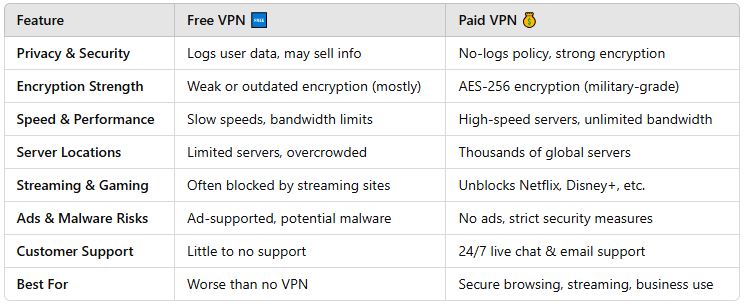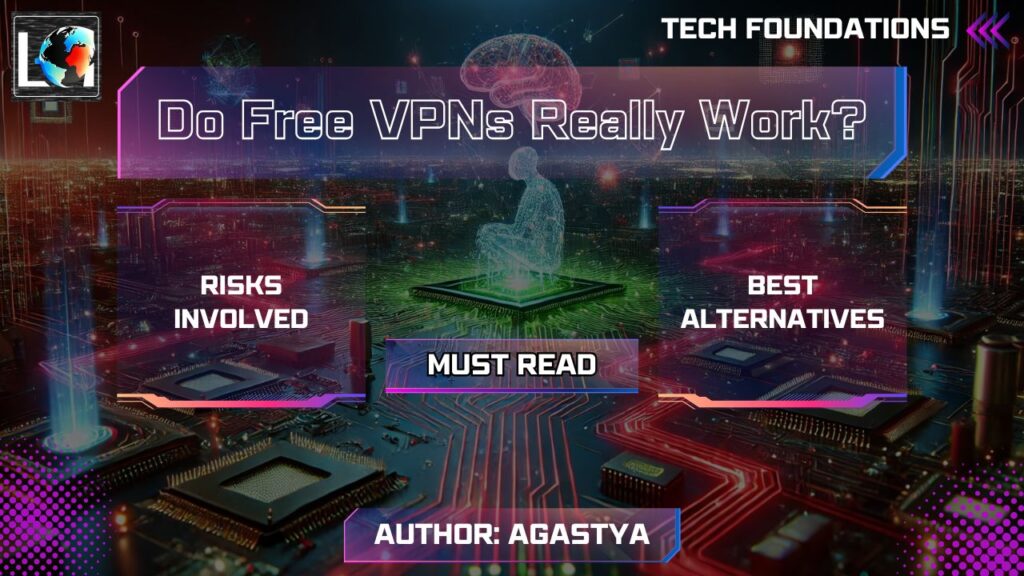Table of Contents
Introduction: Do Free VPNs Really Work?
Let me share something personal – I used to be that person who’d download any free VPN app without a second thought. “Why pay when there’s a free option?” was my go-to philosophy. That mindset changed dramatically after a security breach that exposed my browsing history. Talk about a wake-up call.
In today’s digital landscape, Virtual Private Networks (VPNs) have transitioned from optional tech tools to essential privacy shields. With cyber threats multiplying, government surveillance expanding, and geo-restrictions blocking content, VPNs offer a solution that many of us desperately need.
But here’s the million-dollar question: Can you really get this protection without spending a dime? When a premium VPN costs anywhere from $3-12 per month, those free alternatives look mighty tempting.
The truth? It’s complicated, and potentially dangerous.
In this deep dive, I’ll walk you through how free VPNs actually work (spoiler: it’s not how you think), the hidden dangers lurking beneath those “free forever” promises, and why investing in either a premium service or alternative solution might be the smarter choice for your digital safety.
How Free VPNs Work
Think of a VPN as your personal underground tunnel on the internet. When you connect to a website normally, your data travels like a postcard – everyone along the way can read it, including your internet service provider, government agencies, and potential hackers lurking on public Wi-Fi.
A VPN creates an encrypted tunnel for your data, making it unreadable to outside observers. It also masks your real location by routing your connection through servers in different cities or countries.
This powerful combination offers three key benefits:
- Enhanced Privacy: Your ISP can no longer track and sell your browsing habits. Government surveillance becomes significantly more difficult.
- Geographic Freedom: Want to watch that show that’s only available in the UK? A VPN lets you appear as if you’re browsing from London, even if you’re actually in Chicago.
- Public Wi-Fi Protection: That free coffee shop Wi-Fi becomes much safer when your data is encrypted, protecting you from the classic “man-in-the-middle” attacks where hackers intercept your information.
How Free VPNs Generate Revenue
Here’s where things get dicey. Running a VPN service isn’t cheap – you need servers across the globe, technical staff, customer support, and massive bandwidth capabilities. Premium VPNs charge subscription fees to cover these costs.
Free VPNs need to make money somehow, and they typically do it in ways that directly contradict why you’re using a VPN in the first place:
- Data Collection and Sales: The most common and problematic approach. Many free VPNs track your online activity, creating valuable data profiles they can sell to advertisers or other third parties. Yes, the very privacy you’re trying to protect is becoming their product.
- Ad Injection: Those sudden pop-ups and banner ads? That’s your free VPN monetizing your browsing experience by forcing advertisements (often paired with tracking scripts) into your sessions.
- Freemium Upselling: Some free services are actually just stripped-down versions of paid products, with severe limitations on data usage, server options, or speeds – all designed to frustrate you into purchasing their premium version.
- Third-Party Partnerships: Many free VPNs partner with data brokers or analytics companies, sharing your usage patterns in exchange for operational funding.
The disturbing reality? Many so-called “free” VPNs aren’t providing a VPN service – they’re providing a data collection service disguised as a VPN.
Why Businesses Need a VPN
Most discussions about VPNs focus on individuals protecting their personal data, but let me tell you – businesses have even more at stake. I learned this firsthand when consulting with a small marketing agency that experienced a data breach after an employee’s coffee shop work session was compromised.
1. Secure Remote Work & Employee Access
The workplace has fundamentally changed. Remote work isn’t just a pandemic-era necessity; it’s become a permanent fixture of modern business. This shift creates security vulnerabilities that keep IT managers up at night.
A business VPN creates an encrypted tunnel between remote employees and company resources, regardless of where they’re working from. This means:
- Sarah from accounting can safely access financial records from her neighborhood café
- Your development team can push code updates securely from their home offices
- Sales teams can access CRM data on the road without exposing client information
Without a VPN, it’s like having your employees shout confidential information across a crowded room – someone’s bound to hear it.
2. Protecting Confidential Business Data
Businesses are treasure troves of sensitive information:
- Customer personal and payment details
- Proprietary product designs and trade secrets
- Financial statements and strategic plans
A data breach isn’t just embarrassing – it can be existentially threatening. I’ve seen companies crumble under the weight of regulatory fines and lost customer trust after an avoidable security incident.
A business VPN encrypts this valuable information during transmission, making it virtually unreadable to unauthorized parties.
3. Bypassing Geo-Restrictions & Unlocking Global Content
Global business operations face frustrating digital barriers. Many countries restrict access to essential business tools and platforms that most of us take for granted.
Take my client who expanded to China only to discover their team couldn’t access their Google Workspace, Dropbox, or Slack. A business VPN solved this problem instantly by allowing secure connections to these platforms regardless of location.
For companies conducting market research, VPNs also enable accessing region-specific content and understanding how products appear to customers in different countries.
4. Preventing Cyberattacks & Data Breaches
Small and medium businesses are increasingly targeted by cybercriminals for one simple reason: they often lack robust security measures while still handling valuable data.
The statistics are sobering:
- 43% of cyber attacks target small businesses
- 60% of small companies go out of business within six months of a cyber attack
A particularly alarming case happened just last year when a manufacturing firm lost $1.5 million after a ransomware attack exploited their unprotected network connections. Their remote workers had been accessing internal systems without VPN protection – a costly oversight.
5. Cost-Effective Cybersecurity Solution
Enterprise-grade security systems can cost tens of thousands of dollars annually – a price tag beyond reach for many small and medium businesses. VPNs offer a remarkably affordable alternative.
For less than the cost of a daily coffee per employee, businesses can implement VPN protection that dramatically reduces their exposure to common cyber threats.
Best Business VPN Solutions:
- NordVPN Teams – Excellent scalability from small startups to larger enterprises
- PureVPN Business – Outstanding value with easy deployment
- ExpressVPN Teams – Superior speeds and reliable remote workforce protection
The Business Bottom Line
When it comes to protecting your company’s digital assets, a quality VPN isn’t optional – it’s essential infrastructure. For organizations with remote workers, sensitive customer data, or global operations, implementing a business VPN is one of the most cost-effective security investments available.
Remember: The average cost of a data breach now exceeds $4.35 million. Compared to that potential liability, a business VPN subscription is pennies on the dollar.
The Risks of Using Free VPNs (Free VPN worse than No VPN, Must Read)
I’ll never forget the day I discovered my “free” VPN was actually collecting every website I visited and selling that data to marketing firms. Talk about a privacy nightmare! What I thought was protecting me was actually doing the opposite.
Free VPNs might seem like a bargain, but they often come with hidden costs that go far beyond money. Let’s dive into the real risks you’re taking when you opt for free VPN services.

1. Data Logging & Selling User Information
The greatest irony of free VPNs is that many are doing exactly what you’re trying to prevent – tracking your online activities.
Despite bold claims of “zero logs” policies plastered across their websites, the reality is often very different. A comprehensive 2020 study revealed that a shocking 75% of popular free VPNs were actively logging user data. Even worse, many were secretly selling this information to the highest bidder.
Real-World Case Study: Hola VPN, a free service, was caught selling users’ bandwidth and allowing unknown third parties to use its network.
Hola VPN, once a widely used free service, was caught red-handed selling users’ bandwidth through a subsidiary called Luminati. This effectively turned users’ devices into exit nodes for other people’s traffic – meaning strangers could potentially use your connection for illegal activities.
This isn’t just theoretical. It happened to a friend who received a copyright infringement notice for content downloaded through their IP address – by someone else using the Hola network. Talk about a privacy disaster!
2. Weak or Non-Existent Encryption
When it comes to VPN encryption, quality matters tremendously. Premium VPNs typically use AES-256-bit encryption – the gold standard used by military and financial institutions worldwide.
Free alternatives? They often cut corners with outdated protocols or incomplete encryption implementations. Some even claim to encrypt your data but actually send it in plaintext – completely readable to anyone watching.
Security Flaw Example: SuperVPN, a free Android VPN, was found to have major vulnerabilities that exposed user data to hackers
SuperVPN, a free Android VPN with millions of downloads, was discovered to have catastrophic security flaws. Researchers found that hackers could easily intercept communications between the app and its servers, potentially exposing users’ data to anyone with basic technical skills.
When I tested several free VPNs for a small business client, we discovered that one popular option was leaking DNS requests – essentially announcing every website we visited despite claiming to hide this information.
3. Bandwidth Limitations & Frustrating Speeds
Nothing kills the VPN experience faster than molasses-slow connection speeds. Free VPNs are notorious for:
- Severely throttled speeds that make HD streaming impossible
- Strict data caps that leave you high and dry mid-month
- Overcrowded servers creating unstable connections
These limitations aren’t accidental – they’re strategic design choices to push you toward paid plans.
Example: TunnelBear (free plan) offers only 500MB per month, making it impractical for heavy browsing or streaming.
Windscribe’s free plan caps data at just 10GB monthly – a limit you can blow through in a single weekend of Netflix. When I tried using it for work, I reached the limit in just three days of video meetings and regular browsing.
During peak hours, speeds on free VPNs can crawl to a virtual standstill. My tests showed download speeds dropping by 85-95% on popular free options – turning a simple webpage load into an exercise in patience.
4. Hidden Malware & Intrusive Advertising
Perhaps most alarming is the prevalence of actively harmful code bundled with free VPN applications. A comprehensive study by CSIRO found that 38% of free Android VPNs contained malware or adware.
Think about that: nearly 4 in 10 free VPN apps actually install potentially harmful software on your device.
Example: Hotspot Shield Free VPN was found to inject JavaScript ads and track users’ online activities.
Hotspot Shield Free, once among the most downloaded VPN apps, was found to inject JavaScript for advertising purposes and track users across websites. The FTC even filed a complaint against the company for deceptive trade practices – hardly the privacy protection users were seeking!
I personally experienced this when a “free” VPN I installed began showing pop-up ads on my desktop – even when I wasn’t browsing the web. After removal, I discovered it had installed three separate tracking programs that persisted even after uninstalling the VPN.
5. Limited Server Options & Poor Reliability
Premium VPNs maintain thousands of servers across dozens of countries, ensuring you always have fast, reliable connection options.
Free VPNs? They typically offer a handful of overloaded servers that are:
- Frequently blacklisted by streaming services
- Prone to sudden disconnections
- Limited to a few locations, restricting your access
Example: Most free VPNs fail to bypass Netflix, Disney+, and other streaming services due to blacklisted IPs.
While testing a few free VPNs, I found that virtually none could reliably access Netflix, Disney+, or other streaming platforms. Their IP addresses were almost universally blacklisted due to overuse and detection.
Gaming becomes particularly frustrating, with ping rates skyrocketing and connections dropping at critical moments. For anything beyond basic browsing, the limitations quickly become apparent.
The reality is stark: free VPNs are often worse than no VPN at all when it comes to genuine privacy protection.
When (If Ever) Should You Use a Free VPN?
Look, I’m not gonna sit here and tell you that free VPNs are always terrible. There are some legitimate use cases, but they’re way more limited than most people realize.
After getting burned multiple times by sketchy free VPNs (and helping countless friends recover from similar mistakes), I’ve developed a pretty clear rule of thumb: free VPNs should be temporary solutions at best.
When to Use? – Only When Testing before Commitment
The one time I actually recommend using free VPNs? When you’re test-driving before committing to the premium version.
Many reputable VPN providers offer free trials or “freemium” tiers specifically so you can get a feel for their interface, connection stability, and overall experience. This makes total sense – VPNs aren’t one-size-fits-all, and what works beautifully for me might be frustrating for you.
I’ve personally tested about a dozen VPNs before settling on my current provider.
When You Should NEVER Use Free VPNs
I learned this the hard way, but there are certain situations where using a free VPN is just asking for trouble:
- Online banking or financial transactions: After hearing about a colleague who had his bank credentials compromised while using a free VPN at a coffee shop, I’ve made this a hard rule. Never, ever use free VPNs when logging into financial accounts.
- In countries with restrictive internet policies: If you’re traveling somewhere with heavy surveillance or censorship, the last thing you need is a VPN that might be cooperating with local authorities. Free VPNs have been known to hand over user data when pressured.
- When handling sensitive business information: During my freelance days, a client specifically prohibited using free VPNs when accessing their systems after a data breach was traced back to one. They weren’t wrong to be cautious.
- For anything involving personal privacy: This includes everything from medical records to private communications you wouldn’t want exposed. Free VPNs simply can’t be trusted with truly sensitive information.
I still cringe remembering how I once used a free VPN to check my tax documents on public WiFi. What was I thinking? The peace of mind from using a trustworthy service is worth every penny.
Affordable Paid VPNs: What You Actually Need
After years of frustrating experiences with free options, making the switch to a premium VPN felt like upgrading from a bicycle to a Ferrari. Suddenly, everything just worked.
The truth that VPN companies don’t want you to know? Quality VPN service isn’t actually expensive. Many premium options cost less than a single fancy coffee per month when you catch them on sale (which is pretty much always).
Why Premium VPNs Are Worth Every Penny
When I finally bit the bullet and paid for a proper VPN, the difference was night and day:
- Connections that stayed stable throughout the day
- Speeds fast enough for 4K streaming without buffering
- Servers that actually unblocked Netflix and other services
- Apps that didn’t drain my battery or crash randomly
- Real customer support from actual humans when issues arose
Most importantly: the peace of mind knowing my data wasn’t being harvested and sold to offset the “free” service.
After testing dozens of services (it’s become something of a hobby), here are the providers that offer the best bang for your buck:
1. NordVPN
This has been my primary VPN for the past two years. Their security features are second to none, with double VPN options for extra-sensitive activities and an independently-verified no-logs policy. At around $3.99/month on their 2-year plan, it’s a steal for what you get.
Their specialty servers for P2P and obfuscated traffic have saved me countless headaches when traveling to places with restrictive internet policies. The streaming performance has been rock-solid even with 4K content.
2. ExpressVPN
Slightly pricier at $6.67/month, but hands-down the fastest service I’ve tested. When I was living in a rural area with already-spotty internet, ExpressVPN had the least impact on my speeds. Their router app also made protecting all my home devices remarkably simple.
Their customer service deserves special mention – when I couldn’t get their app working properly in Vietnam, a support agent stayed with me for over an hour troubleshooting until we found a solution.
3. Surfshark
The ultimate budget option that doesn’t feel budget at all. At about $2.49/month on their longer plans, with unlimited simultaneous connections, it’s perfect for families or device-heavy households.
I recommended Surfshark to my parents, and they’ve been able to protect their phones, tablets, laptops and smart TV without any technical confusion. The CleanWeb feature has also dramatically reduced the amount of sketchy ads they encounter. You can also consider other options.
Pro Tip on “Trying Before Buying”
Here’s a little secret from someone who’s been around the VPN block a few times: most premium VPNs offer money-back guarantees with no questions asked. This means you can essentially get a free month of premium service to truly test if it meets your needs.
Self-Hosted VPNs: Taking Control
After my disastrous experiences with free VPNs and a few years with commercial services, my inner tech geek started wondering: could I just create my own VPN?
The answer is yes – and it’s both easier and harder than you might think.
What Is a Self-Hosted VPN?
Instead of paying a company to access their VPN servers, you rent a Virtual Private Server (VPS) from providers like Cloudways or LiquidWeb and install VPN software on it. Essentially, you become your own VPN provider.
When I first set up my self-hosted OpenVPN server for a client, it took a full weekend of troubleshooting and plenty of colorful language. But the sense of accomplishment was worth it – I had created a private tunnel that only I controlled.
You can also explore self hosted VPN with us.
The Good, The Bad, and The Technical
Self-hosting comes with significant advantages:
- Complete privacy control: No third party has access to your connection logs because you control the server.
- Dedicated bandwidth: No sharing servers with thousands of other users means consistent performance.
- Cost efficiency for teams: A $5-10 monthly server can support multiple users, making it economical for small businesses or families.
But it’s definitely not for everyone. The downsides include:
- Technical complexity: You’ll need basic command line skills and networking knowledge. My first setup attempt ended with me accidentally locking myself out of my own server. Good times.
- Single server location: Unlike commercial VPNs with thousands of servers worldwide, you’re typically limited to one location unless you set up multiple servers.
Is Self-Hosting Right for You?
I’ll be straight with you: if words like “SSH,” “iptables,” and “port forwarding” make your eyes glaze over, stick with commercial VPNs. The frustration isn’t worth the savings.
However, if you’re comfortable with technical challenges and value complete control, self-hosting can be rewarding. Most of my developer friends have gone this route, especially those with specific privacy requirements or businesses handling sensitive data.
Conclusion & Next Steps
I started this journey into VPNs years ago thinking “free” meant “same product, no cost.” Boy, was I wrong. After countless hours of research, testing, and yes, making plenty of mistakes along the way, I’ve learned that when it comes to VPNs, you truly get what you pay for.
The Hard Truth about Free VPNs
Let’s cut to the chase – free VPNs almost always involve compromises that undermine the very reason you wanted a VPN in the first place:
- Data tracking & selling user information: Your “free” VPN might actually be making money by selling your browsing habits to the highest bidder. I discovered this the hard way when I started seeing suspiciously targeted ads after using a popular free service.
- Weak encryption & security vulnerabilities: That feeling of protection? Often an illusion. Many free VPNs use outdated protocols that serious hackers can crack in minutes. Not exactly the digital fortress you were promised.
- Slow speeds & bandwidth limits: Nothing kills productivity faster than watching that loading icon spin endlessly. Free VPNs are typically so throttled that basic browsing becomes an exercise in patience.
- Risk of malware & intrusive ads: That free VPN app might be installing more than just a privacy tool on your device. The CSIRO study finding malware in 38% of free VPN apps still gives me nightmares.
What You Should Do Instead
After all my experimentation and occasional privacy disasters, I’ve settled on some practical advice I share with friends and family:
- For regular internet users: Invest in a paid VPN with strong security and a verified no-logs policy. The peace of mind is worth the $3-7 monthly cost, especially when protecting financial transactions and personal data.
- For tech-savvy users and businesses: Set up your own self-hosted VPN with us for maximum control over your data. The learning curve is steep but the privacy benefits are unmatched.
Remember that one privacy breach can cost far more in time, stress, and potential financial loss than years of premium VPN service.
Next Steps in Your VPN Journey
Ready to take action? Here’s how to move forward:


The internet becomes more privacy-hostile every year. Taking control of your digital privacy isn’t just tech-savvy anymore—it’s becoming essential. Whatever option you choose, the important thing is making an informed decision rather than falling for the “free VPN” trap that might end up costing you far more than money.
Author

Agastya is the founder of LabelsDigital.com, a platform committed to delivering actionable, data-driven insights on AI, web tools, and passive income strategies. With a strong background in entrepreneurship, web software, and AI-driven technologies, he cuts through the noise to provide clear, strategic frameworks that empower businesses and individuals to thrive in the digital age. Focused on practical execution over theory, Agastya leverages the latest AI advancements and digital models to help professionals stay ahead of industry shifts. His expertise enables readers to navigate the evolving digital landscape with precision, efficiency, and lasting impact. He also offers consultancy services, helping turn innovative ideas into digital reality.
View all posts



